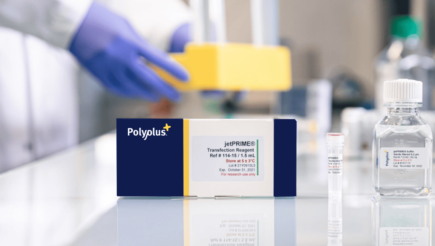jetPRIME® is a versatile DNA and siRNA transfection reagent that ensures high DNA transfection efficiency and excellent gene silencing.

Co-transfection of several nucleic acids can be required for various purposes and different nucleic acids can be delivered together. These experiments can provide useful data, but appropriate reagent needs to be used in order to efficiently deliver several nucleic acids together and at the same time allow good cell viability. One of the crucial parameters when performing co-transfection experiments is the total amount of nucleic acid used as nucleic acid in excess can be toxic to the cells.
In some cases co-transfection of DNA is necessary to study overexpression of two genes simultaneously or to use overexpression of one gene to quantify the transfection efficiency and study the overexpression of another gene. Co-transfection of several plasmids is also usually performed in the process of virus production.
In some cases there is a need to co-deliver DNA with siRNA. Usually the goal of these experiments is to overexpress one gene and silence another endogenous gene or the exogenously added gene.
jetPRIME® reagent is perfectly suited for such co-transfection experiments as they can be successfully performed by using one single reagent to deliver several nucleic acids in a single transfection reaction. jetPRIME® can be used for co-transfection of several DNA plasmids or transfection of DNA plasmid with siRNA, miRNA or any other oligonucleotide.
If you plan to co-deliver several siRNA molecules together, INTERFERin® is our best suited reagent for this application.